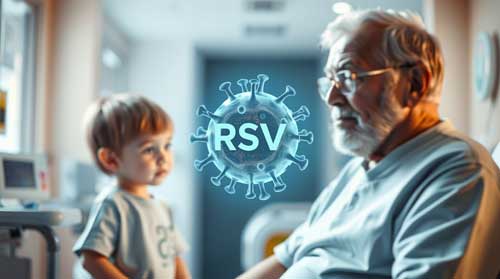Respiratory Syncytial Virus (RSV)
Please like and subscribe if you enjoyed this video 🙂
Introduction
This article provides an overview of Respiratory Syncytial Virus (RSV) for the general public. It covers the introduction to RSV, its symptoms, transmission methods, diagnosis techniques, prevention strategies, treatment options, current research developments, and frequently asked questions. The article aims to educate viewers about RSV, its impact on public health, and the latest advancements in managing this common respiratory infection.
Respiratory Syncytial Virus, commonly known as RSV, is a widespread respiratory virus that affects people of all ages. However, it can be particularly serious for infants, young children, and older adults. RSV is a leading cause of respiratory infections and hospitalizations, especially in children under the age of five. This video will provide a comprehensive understanding of RSV, its effects on the human body, and how to manage and prevent its spread.
Symptoms
Symptoms:
RSV can cause a range of symptoms, which may vary depending on the age of the infected person and the severity of the infection.
Common symptoms include: Runny nose, Cough, Sneezing, Fever, Wheezing, Decreased appetite, Difficulty breathing.
In infants and young children, additional symptoms may include: Irritability. Decreased activity. Trouble feeding. Pauses in breathing (apnea).
For older adults and people with weakened immune systems, symptoms can be more severe and may include:
High fever. Severe cough. Shortness of breath. Rapid breathing. Bluish color of the skin due to lack of oxygen.
It’s important to note that symptoms can range from mild, cold-like symptoms to severe respiratory distress requiring hospitalization.
Transmission
RSV is highly contagious and spreads easily from person to person. The virus can be transmitted through:
Respiratory droplets: When an infected person coughs or sneezes, tiny droplets containing the virus can be inhaled by others nearby.
Direct contact: Touching surfaces contaminated with RSV and then touching your face, particularly your eyes, nose, or mouth, can lead to infection.
Close contact: Kissing, shaking hands, or sharing utensils with an infected person can spread the virus.
Contaminated objects: The virus can survive on surfaces like doorknobs, toys, and countertops for several hours.
RSV can spread quickly in settings where people are in close contact, such as daycare centers, schools, and nursing homes. The virus is most contagious in the first few days after infection, but people can continue to spread it for up to 8 days, even after symptoms have disappeared.
Diagnosis
Diagnosing RSV typically involves a combination of physical examination, medical history review, and laboratory tests. The following methods are commonly used:
Physical examination: A healthcare provider will listen to the patient’s lungs and check for signs of respiratory distress.
Medical history: The doctor will ask about symptoms and their duration, as well as any potential exposure to RSV.
Rapid antigen tests: These tests can quickly detect RSV antigens in nasal secretions, providing results within minutes.
PCR (Polymerase Chain Reaction) tests: This highly sensitive test can detect the genetic material of the virus in respiratory secretions.
Blood tests: While not typically used to diagnose RSV, blood tests may be ordered to check for signs of infection or to rule out other conditions.
Chest X-rays: These may be used to check for complications such as pneumonia in severe cases.
In many cases, especially for mild infections, a clinical diagnosis based on symptoms and physical examination may be sufficient without the need for laboratory tests.
Prevention
Preventing the spread of RSV is crucial, especially for high-risk groups. Here are some effective prevention strategies:
Hand hygiene: Wash hands frequently with soap and water for at least 20 seconds, especially before touching your face or eating.
Avoid close contact: Keep distance from people who are sick and avoid kissing or sharing utensils with them.
Cover coughs and sneezes: Use a tissue or your elbow to cover your mouth and nose when coughing or sneezing.
Clean and disinfect surfaces: Regularly clean frequently touched surfaces like doorknobs, toys, and mobile devices.
Stay home when sick: If you or your child has RSV symptoms, stay home to avoid spreading the virus to others.
Breastfeeding: For infants, breastfeeding can provide antibodies that help protect against RSV.
Avoid exposure: Keep infants and high-risk individuals away from crowded places during RSV season.
Don’t smoke: Avoid smoking around children, as exposure to tobacco smoke increases the risk of severe RSV infections.
RSV immunization: For high-risk infants, a monthly injection of palivizumab (Synagis) during RSV season can help prevent severe RSV illness.
Treatment
Currently, there is no specific cure for RSV, and treatment mainly focuses on managing symptoms and supporting the body’s natural healing process. Treatment options include:
Rest and fluids: Encourage plenty of rest and ensure adequate fluid intake to prevent dehydration.
Over-the-counter pain relievers: Acetaminophen or ibuprofen can help reduce fever and relieve discomfort. (Note: Never give aspirin to children due to the risk of Reye’s syndrome.)
Nasal saline drops and suctioning: For infants, using saline drops and a bulb syringe can help clear nasal congestion.
Humidifier: Using a cool-mist humidifier can help ease congestion and coughing.
Prescription medications: In some cases, doctors may prescribe bronchodilators to help open airways or corticosteroids to reduce inflammation.
Oxygen therapy: For severe cases, supplemental oxygen may be necessary to maintain adequate oxygen levels.
Antiviral medications: In specific situations, such as for immunocompromised patients, antiviral drugs like ribavirin may be used, though their effectiveness is limited.
Hospital care: Severe cases, especially in infants or older adults, may require hospitalization for intensive supportive care, including intravenous fluids, breathing treatments, or mechanical ventilation.
It’s important to note that antibiotics are not effective against RSV, as it is a viral infection. However, if a secondary bacterial infection develops, antibiotics may be prescribed.
Current Research
Research on RSV is ongoing, with several areas of focus:
Vaccine development: Multiple RSV vaccines are in various stages of clinical trials. These include:
Maternal vaccines to protect newborns. Vaccines for older adults. Pediatric vaccines for young children.
New antiviral treatments: Researchers are working on developing more effective antiviral drugs to treat RSV infections.
Monoclonal antibodies: Studies are exploring the use of long-acting monoclonal antibodies for RSV prevention in infants and high-risk individuals.
Improved diagnostic tools: Research is ongoing to develop faster, more accurate diagnostic tests for RSV.
Understanding virus biology: Scientists are studying the molecular structure and behavior of RSV to identify new targets for treatment and prevention.
Host immune response: Research into how the human immune system responds to RSV could lead to new therapeutic approaches.
Long-term effects: Studies are examining the potential long-term impacts of RSV infection, particularly on lung health.
Combination therapies: Researchers are exploring the effectiveness of combining different treatment approaches for better outcomes.
These research efforts aim to improve RSV prevention, diagnosis, and treatment, potentially reducing the global burden of this common respiratory infection.
Frequently Asked Questions
Can adults get RSV? Yes, adults can get RSV. While it’s often milder in healthy adults, it can be severe in older adults or those with weakened immune systems.
How long does RSV last? RSV symptoms typically last 1-2 weeks, but can persist longer in severe cases or in individuals with weakened immune systems.
Is there a vaccine for RSV? Currently, there is no approved vaccine for RSV, but several are in development and clinical trials.
Can you get RSV more than once? Yes, it’s possible to get RSV multiple times, as immunity after infection is not long-lasting.
How is RSV different from the common cold or flu? While symptoms can be similar, RSV can lead to more severe lower respiratory tract infections, especially in young children and older adults.
When should I seek medical care for RSV? Seek medical attention if you or your child experiences difficulty breathing, high fever, bluish skin color, or signs of dehydration.
Is RSV contagious before symptoms appear? Yes, people infected with RSV can be contagious for 3-8 days before showing symptoms.
Can RSV lead to other health problems? In some cases, RSV can lead to complications such as pneumonia or bronchiolitis, especially in high-risk groups.
How can I tell if my baby has RSV? Look for symptoms like difficulty breathing, decreased activity, poor feeding, and fever. If concerned, consult a healthcare provider.
Is there a specific RSV season? In temperate climates, RSV infections typically peak during fall, winter, and early spring, but can occur year-round in some regions.
Summary Statements
Summary Statements:
RSV is a common respiratory virus that can affect people of all ages but is particularly serious for infants, young children, and older adults.
Symptoms of RSV range from mild cold-like symptoms to severe respiratory distress, and the virus is highly contagious.
Diagnosis typically involves physical examination and may include laboratory tests such as rapid antigen tests or PCR tests.
Prevention strategies include good hand hygiene, avoiding close contact with infected individuals, and keeping high-risk individuals away from crowded places during RSV season.
Treatment for RSV focuses on managing symptoms and may include rest, fluids, over-the-counter pain relievers, and in severe cases, hospital care.
Current research is focused on developing vaccines, new antiviral treatments, and improved diagnostic tools for RSV.
While there is currently no specific cure for RSV, ongoing research and developing prevention strategies offer hope for better management of this common respiratory infection in the future.
[Link]



